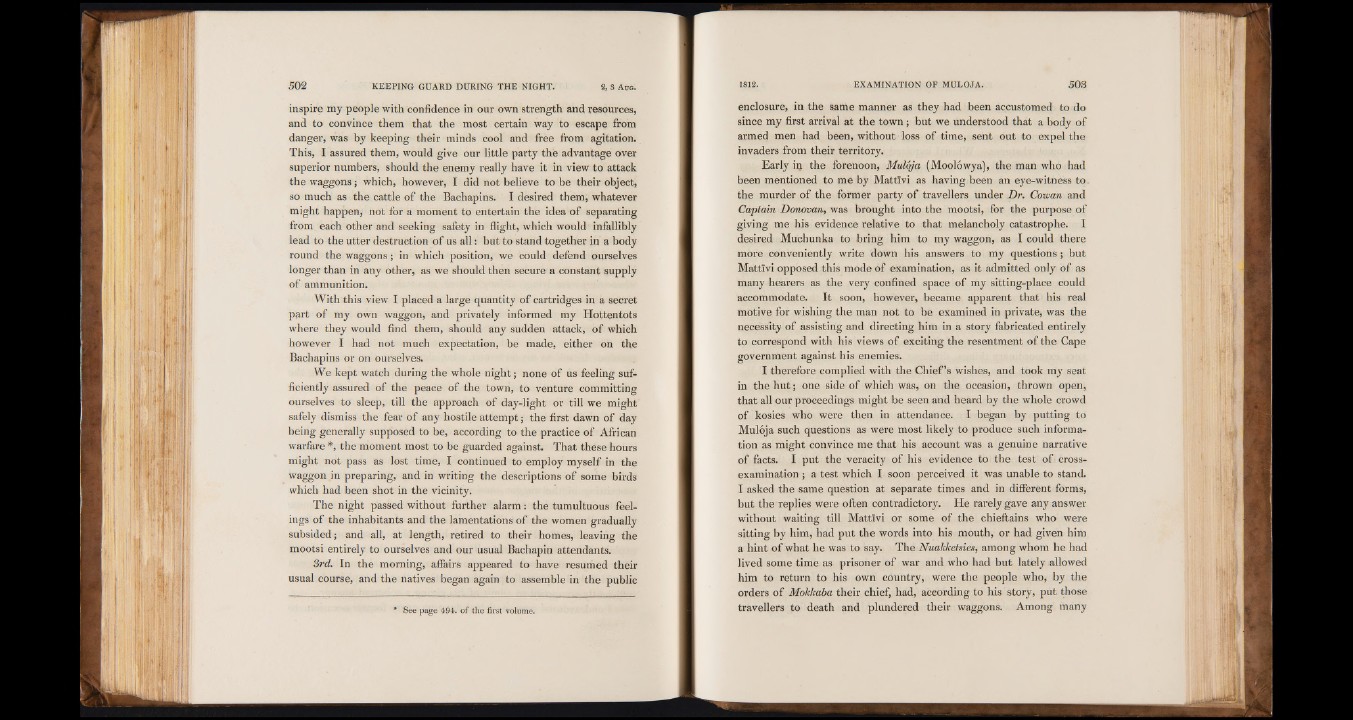
inspire my people with confidence in our own strength and resources,
and to convince them that the most certain way to escape from
danger, was by keeping their minds cool and free from agitation.
This, I assured them, would give our little party the advantage over
superior numbers, should the enemy really have it in view to attack
the waggons; which, however, I did not believe to be their object,
so much as the cattle of the Bachapins. I desired them, whatever
might happen, not for a moment to entertain the idea of separating
from each other and seeking safety in flight, which would infallibly
lead to the utter destruction of us all: but to stand together in a body
round the waggons; in which position, we could defend ourselves
longer than in any other, as we should then secure a constant supply
of ammunition.
With this view I placed a large quantity of cartridges in a secret
part of my own waggon, and privately informed my Hottentots
where they would find them, should any sudden attack, of which
however I had not much expectation, be made, either on the
Bachapins or on ourselves.
We kept watch during the whole night; none of us feeling sufficiently
assured of the peace of the town, to venture committing
ourselves to sleep, till the approach of day-light or till we might
safely dismiss the fear of any hostile attempt; the first dawn of day
being generally supposed to be, according to the practice of African
warfare *, the moment most to be guarded against. That these hours
might not pass as lost time, I continued to employ myself in the
waggon in preparing, and in writing the descriptions of some birds
which had been shot in the vicinity.
The night passed without further alarm: the tumultuous feelings
of the inhabitants and the lamentations of the women gradually
subsided; and all, at length, retired to their homes, leaving the
mootsi entirely to ourselves and our usual Bachapin attendants.
3rd. In the morning, affairs appeared to have resumed their
usual course, and the natives began again to assemble in the public
enclosure, in the same manner as they had been accustomed to do
since my first arrival at the town; but we understood that a body of
armed men had been, without loss of time, sent out to expel the
invaders from their territory.
Early iij the forenoon, Muloja (Moolowya), the man who had
been mentioned to me by Mattlvi as having been an eye-witness to.
the murder of the former party of travellers under Dr. Cowan and
Captain Donovan, was brought into the mootsi, for the purpose of
giving me his evidence relative to that melancholy catastrophe. I
desired Muchunka to bring him to my waggon, as I could there
more conveniently write down his answers to my questions; but
Mattivi opposed this mode of examination, as it admitted only of as
many hearers as the very confined space of my sitting-place could
accommodate. It soon, however, became apparent that his real
motive for wishing the man not to be examined in private, was the
necessity of assisting and directing him in a story fabricated entirely
to correspond with his views of exciting the resentment of the Cape
government 0 aOgainst his enemies. I therefore complied with the Chief’s wishes, and took my seat
in the hut; one side of which was, on the occasion, thrown open,
that all our proceedings might be seen and heard by the whole crowd
of kosies who were then in attendance. I began by putting to
Muloja such questions as were most likely to produce such information
as might convince me that his account was a genuine narrative
of facts. I put the veracity of his evidence to the test of cross-
examination ; a test which I soon perceived it was unable to stand.
1 asked the same question at separate times and in different forms,
but the replies were often contradictory. He rarely gave any answer
without waiting till Mattlvi or some of the chieftains who were
sitting by him, had put the words into his mouth, or had given him
a hint of what he was to say. The Nuakketsies, among whom he had
lived some time as prisoner of war and who had but lately allowed
him to return to his own country, were the people who, by the
orders of Mokkaba their chief, had, according to his story, put those
travellers to death and plundered their waggons. Among many